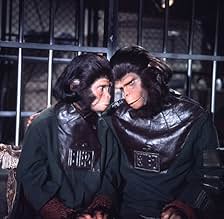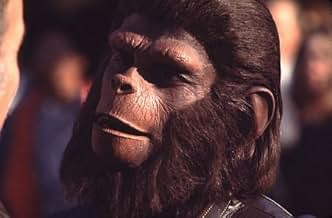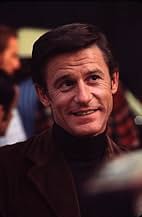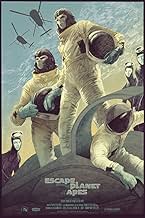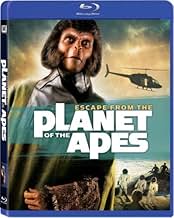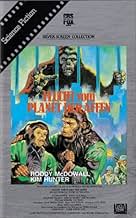El mundo está conmocionado por la aparición de tres chimpancés parlantes, que llegan misteriosamente en una nave espacial estadounidense. Se convierten en la flor y nata de la sociedad, pero... Leer todoEl mundo está conmocionado por la aparición de tres chimpancés parlantes, que llegan misteriosamente en una nave espacial estadounidense. Se convierten en la flor y nata de la sociedad, pero un hombre cree que son una amenaza.El mundo está conmocionado por la aparición de tres chimpancés parlantes, que llegan misteriosamente en una nave espacial estadounidense. Se convierten en la flor y nata de la sociedad, pero un hombre cree que son una amenaza.
- Dirección
- Guión
- Reparto principal
- Premios
- 1 nominación en total
Reseñas destacadas
Lovable simians Zira and Cornelius (expertly played by Kim Hunter and Roddy McDowall) lose their friend Dr. Milo (Sal Mineo!) early on in a tragic accident, and find themselves in a strange situation when mankind first welcomes them as celebrities and garnishes them with gifts, but ultimately begins to fear when it is learned that Zira is pregnant with an ape offspring that could grow to overtake humanity.
We really grow to sympathize with the plight of the chimpanzee couple, and we fear along with them and the safety of their child when they become hunted fugitives later in the story. Eric Braeden is very good as the quintessential villain out to kill the ape family at any cost.
Some people enjoy picking on the APES sequels as they continued, but I've always felt this series consistently remained very intelligent and had something powerful to say about race relations and prejudice. People want to know how apes could ever manage to send Taylor's ship into orbit; I say that if you can suspend disbelief long enough to accept the notion of intelligent apes, then it shouldn't be that far a reach to accept that Dr. Milo was the genius of his time who just could pull it off; the Thomas Edision of his type, if you will.
The timeline in the five apes films is often admittedly contradictory, but there are ways that fans of the Apes movies have been able to make them work. For example, in this film Cornelius seems to talk about Ape History and Evolution in a way that actually doesn't follow suit during the next two installments. That's because the very arrival of Zira and Cornelius onto present-day Earth of 1973, and the subsequent birth of their baby, will accelerate the procedure from how Cornelius remembered it, as we'll see in the next two chapters. The circumstances for the future will be sped up and changed, and the apes will evolve at a much quicker rate.
Some of the other dubious complaints are aimed at the "lesser budgets," or supposed "TV Movie Look" of the sequels from this point on -- but this story in ESCAPE does not require mind-numbing special effects or hordes of CGI-rendered ape figures swarming Los Angeles to make it effective. It's got a lot of heart and good writing with characters we care about, and that's all it needs. ***1/2 out of ****
In one respect Heston was to be proved right. "Planet of the Apes" is a classic, one of the best science-fiction movies ever made and one that combines an exciting plot with philosophical depth. It is frequently said that sequels are generally inferior to the original films, but seldom is this is as true as in the case of "Beneath the Planet of the Apes", a hopeless mess of a film. Neither its lack of artistic merit, however, nor its explosive ending dissuaded the filmmakers from making a third "Apes" film. An ingenious device was found to avoid the problems posed by planetary destruction; it is explained that shortly before the Earth was destroyed three of the apes found the wreckage of Taylor's spacecraft, repaired it and used it to travel back in time to 1970s America.
Although one of the apes is killed in an unfortunate incident shortly after arrival, the American public take to the two survivors, Cornelius and his wife Zira (both of whom played important parts in the first two films). The two intelligent, talking chimpanzees become media celebrities, and the early scenes are much lighter in tone than the two earlier films, at times even comic, as the two apes become after-dinner speakers and discover the joys of alcohol. The tone, however, gradually darkens. Figures in the government become alarmed by talk of a future in which men are dominated by apes, and Dr Hasslein, the President's sinister Germanic adviser, (based on Henry Kissinger?) is convinced that Zira and Cornelius represent a threat to the human race, especially after it is discovered that Zira is pregnant.
My disappointment with "Beneath...." had hitherto dissuaded me from watching any more of the later episodes in the "Apes" canon, so I was pleasantly surprised by "Escape.......". Although it lacks the depth and brilliance of "Planet of the Apes", it is considerably better than its immediate predecessor. The reason for its relative success lies with the fine contributions of its two stars, Roddy McDowell and Kim Hunter. Their characters played important supporting roles on the original film; here they take centre stage. The original had Heston's character Taylor at its centre, a human in danger from the apes. In "Escape......" the roles are reversed, with two lovable, and deeply human, apes in danger from humans. There is, however, a difference between the two films. The danger to Taylor came largely from ignorance; the apes, particularly Dr Zaius, saw him as a brute beast, like the other humans of their planet, and refused to listen to the evidence that suggested that he was, in fact, an intelligent being like themselves. Cornelius and Zira are in danger because of both their human and their non-human characteristics. Hasslein knows that they are intelligent beings who seem human and yet are not, and hates and fears them for precisely that reason. Just as they pitied and befriended Taylor, so they are in their turn befriended by two human scientists who try and save them from Hasslein.
There are a couple of inconsistencies between this and the earlier films, where the apes' society is shown as being technologically less advanced than ours, on a par with sixteenth or seventeenth century Europe. It is not explained how individuals from such a society could have succeeded in repairing and operating a spacecraft. Another inconsistency is that Cornelius and Zira know how the apes came to seize control of the Earth from humans and even state that this story is told in the Sacred Scrolls, the holy books of the apes' religion. In "Planet of the Apes" we are to understand that the Scrolls explicitly deny that humans ever had the powers of speech and reason, which is why Zaius is so reluctant to admit that Taylor can speak. These inconsistencies, however, are not really plot-holes as such and are unlikely to worry those who come to "Escape......." without having seen its predecessors. "Escape......." can be seen as a film in its own right rather than as a mere sequel, a film which starts out as a comedy and then turns into a serious thriller as the apes try to escape from their human enemies. Although it is less philosophical than the first film, it can perhaps be seen as an allegory of racism as Hasslein's paranoia leads him to treat as enemies those who bear no ill-will to him and his kind and whose only crime is to be different from him. It is significant that his name is derived from the German for "hate". 6/10
So the other day I got all five films on Blu Ray for about 15 dollars. And when I watched ESCAPE as a 55 year old I was very impressed. It's not really a kid's adventure film, or even a science fiction spectacle. This movie is a tragedy, in the most profound sense of the word. In spirit it's much closer to CHINATOWN than the original PLANET OF THE APES.
Everyone remembers Zira and Cornelius as a cute, fun couple. That's how I remembered them too. But when you actually watch the film you see that they are really tragic heroes. When they flee the hospital with their baby there are Biblical overtones. (The President actually compares himself to Herod!) But what's still more disturbing is the way Zira herself owns up to the savage things that went on in her own laboratory in the future world. Her self-knowledge is a grim component of her eventual tragic fate. Her insistence on truth only makes her more admirable after she reveals some truly terrible secrets.
It's a waste of time to point out that Kim Hunter and Roddy McDowell both give career best performances as Zira and Cornelius. But what astonished me after forty-five years was the incredible intensity of Eric Braeden as Dr. Otto Hasslein. (He was just as spectacular as the doomed werewolf in a classic episode of KOLCHAK: THE NIGHT STALKER.) Dr. Hasslein is clearly meant to remind us of Nazi scientists and doctors who did unspeakable things in World War II. But at the same time he's like the tormented Christian heroes in THE OMEN movies, searching for the Anti Christ before the earth runs out of time. Each chilling thing he does is made more chilling by the fact that he's sincere in trying to stop what he thinks of as real evil. On the other hand, William Windom is surprisingly affable and humane as the President of the United States. STAR TREK fans will remember his epic meltdown in "The Doomsday Machine," but here he plays the voice of reason, a decent man who refuses to become hysterical in the face of mankind's doom.
Superb script, intense, haunting drama, beautiful tragic characters . . . All that's missing is the action, excitement, and gorillas on horseback!
Where the first sequel was a carbon-copy of the original, up until the end that is, "Escape..." is certainly different. It would have been difficult to predict what they could have done with another sequel following the ending of the last one but they certainly did do a good job here. As likable as Zira and Cornelius were in the first two instalments, it is here that we truly start to care for them as characters. McDowall and Hunter are brilliant together. Bradford Dillman (Who would later take the lead in "Piranha") also stars. The last ten minutes came out of nowhere and were shocking and this time, we were left with no doubt that another sequel would follow.
Things turn grim in the 2nd half, as the fad wears off and our leadership begins to take the threat of possible future ape domination rather seriously. The most interesting character becomes the chief human scientist, played by Braeden, who starts out typically dispassionate but soon reveals an intense personal desire to preserve the human race and society, to the point of fanaticism. In his coldly intelligent eyes, only he sees the truly apocalyptic threat presented by the chimps' pregnancy. He's the nominal villain, but he sees himself as the only one who gives a damn. Some of the sf plot lines regarding time travel are very clever, while others are a bit clumsy. It's clever that the two evolved time-traveling chimps may now be the cause of the future time-line ruled by an ape society. But they reveal to have a knowledge of their history that did not exist in the previous two films. Also, rather than letting events evolve over a century or more following what happens here, the next film accelerates everything to change the world in the next 20 years - see "Conquest of the Planet of the Apes."
¿Sabías que...?
- CuriosidadesThe film's villain, Dr. Hasslein, had been briefly mentioned at the beginnings of El planeta de los simios (1968) and Regreso al planeta de los simios (1970).
- PifiasThe ape world is an underdeveloped and primitive society that believe flight is not possible according to the first film. Yet, three apes were able to find Taylor's ship, raise it from the depths of a lake, dry it out completely right down to the electronic equipment, figure out how to fly it, then finally enter a time warp to bring themselves to 20th century Earth. (Note: Apparently, Dr. Milo - after raising the ship from the water (most likely with help) - studied the ship's technical manuals. Entering the time warp was accidental when the Alpha and Omega bomb had detonated while the ship had been in flight).
- Citas
Chairman of the President's Committee of Inquiry: [testing Lewis's assertion that the apes can speak] What is your name?
Dr. Zira: Zira.
Chairman of the President's Committee of Inquiry: One might as well be talking to a parrot.
Dr. Zira: A parrot?
Chairman of the President's Committee of Inquiry: What did I tell you? Mechanical mimicry. Unique in an ape, vocally, without a doubt, but... does the other one talk?
Cornelius: Only when she lets me.
- Créditos adicionalesThe 20th Century Fox logo does not appear on this film.
- ConexionesFeatured in Batalla por el planeta de los simios (1973)
Selecciones populares
- How long is Escape from the Planet of the Apes?Con tecnología de Alexa
Detalles
- Fecha de lanzamiento
- País de origen
- Sitios oficiales
- Idioma
- Títulos en diferentes países
- Escape from the Planet of the Apes
- Localizaciones del rodaje
- Empresas productoras
- Ver más compañías en los créditos en IMDbPro
Taquilla
- Presupuesto
- 2.500.000 US$ (estimación)
- Recaudación en Estados Unidos y Canadá
- 12.348.905 US$
- Recaudación en todo el mundo
- 12.348.905 US$
- Duración1 hora 38 minutos
- Color
- Relación de aspecto
- 2.39 : 1



